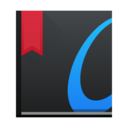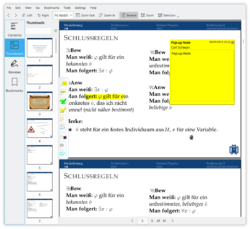Okular: Difference between revisions
(Removed outdated phrase "based on KPDF".) |
(Linked the team) |
||
| Line 19: | Line 19: | ||
You can talk to developers and other users on IRC, irc.freenode.org, channel #okular | You can talk to developers and other users on IRC, irc.freenode.org, channel #okular | ||
If you are intested in contributing to Okular, please contact the team. Programmers and non-coders alike are welcome. Details of how to contact us can be found [http://okular.kde.org/contact.php here]. | If you are intested in contributing to Okular, please contact the [http://okular.kde.org/team.php team]. Programmers and non-coders alike are welcome. Details of how to contact us can be found [http://okular.kde.org/contact.php here]. | ||
Revision as of 13:49, 10 September 2008
What is Okular

Okular is a universal document viewer for KDE 4.
The last stable release is Okular 0.7, shipped in the kdegraphics module of KDE 4.1.
You can watch for development at the project Home Page.
Background
Its development began as part of Google's Summer of Code program. The description of the project is located at KDE Developer's Corner.
Okular combines the excellent functionalities of KPDF with the versatility of supporting different kind of documents, like PDF, Postscript, DjVu, CHM, and others.
The document format handlers page has a chart describing in more detail the supported formats and the features supported in each of them.

As well as supporting many formats, Okular offers such features as text selection, annotation, extraction of files embedded within a document, and many other surprises. Screenshots of Okular in action can be seen here.
You can talk to developers and other users on IRC, irc.freenode.org, channel #okular
If you are intested in contributing to Okular, please contact the team. Programmers and non-coders alike are welcome. Details of how to contact us can be found here.
